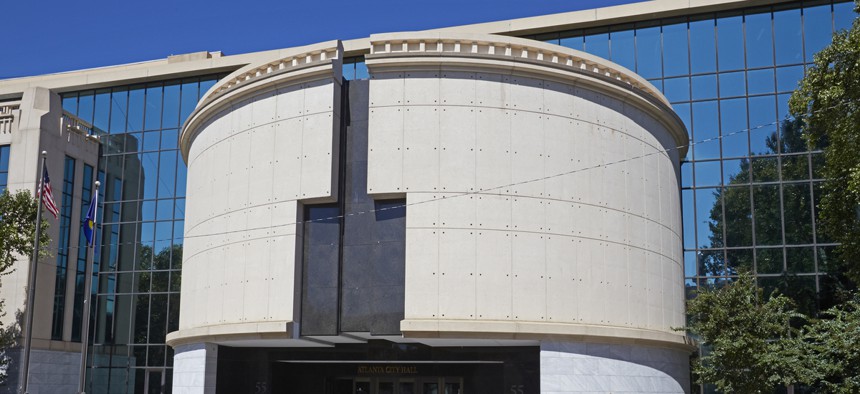Rule Change Would Help Low-Level Offenders in Atlanta

Atlanta City Hall Shutterstock
Critics, including the city’s mayor, have pointed to the role cash-bail plays in sustaining a two-tiered system of justice.
The movement to reform the cash-bail system in the United States moved a step forward in Atlanta on Monday, when the city council unanimously voted to abolish cash-bail for people charged with minor, mainly nuisance, violations.
The proposal was championed by Mayor Keisha Lance Bottoms, the former Atlanta City Council member and lawyer who won a runoff election in December. Bottoms took up the cause in response to civil rights groups who have worked for years to spotlight the way the Atlanta’s “low-level offenders [can] sit in jail for days, weeks or months because they cannot afford bail amounts as low as $100,” as The Atlanta Journal-Constitution put it.
The new rule will allow Atlanta Detention Center authorities to release defendants charged with nonviolent misdemeanors or city ordinance violations for the weeks or months before they’re scheduled to appear in court.
The Atlanta-based Southern Center for Human Rights and the Washington, D.C.-based Civil Rights Corps last year threatened to sue Atlanta for jailing people simply because they lacked the resources to post bail.
As the Journal-Constitution notes, federal civil rights lawsuits targeting cash-bail systems have been filed in Texas and Georgia. And cities including Chicago, Nashville and New Orleans have abolished cash-bail for minor crimes such as public drunkenness, panhandling and driving without a license.
Critics point to the role cash-bail plays in sustaining a two-tiered system of justice in the nation, in which people without access to resources lose their freedom in disproportionate numbers and face greater risk of harm while incarcerated.
HuffPost published the results of an investigation last year that found that most of the 800 people who died in pre-trial lockups were poor. The authors also found that dozens of those who died faced “low-level or nonviolent charges, such as drug possession, traffic offenses or probation violations,” and that “many faced bail amounts ranging between a few hundred and few thousand dollars.”
Citing federal data, HuffPost also reported that nearly 750,000 inmates are being held in jails around the country at any given time, that more than 60 percent of those inmates have been convicted of no crimes, and that holding those inmates adds up to an estimated $9 billion in tax money annually.
In Atlanta, the commercial bail-bonding industry testified against the proposal to change the current system. The industry has opposed similar changes in other municipalities.
According to the Justice Policy Institute, the industry takes in about $2 billion in revenue every year.
John Tomasic is a journalist who is based in Seattle.
NEXT STORY: Traffic Deaths Have Gone Up. What Can Governors Do About it?





